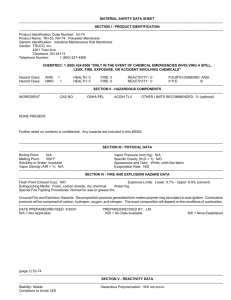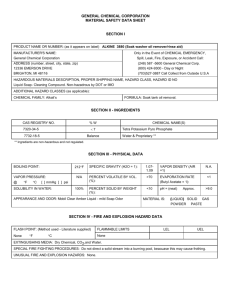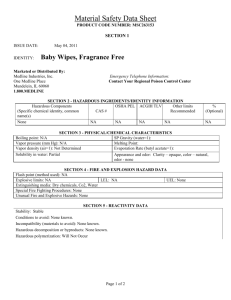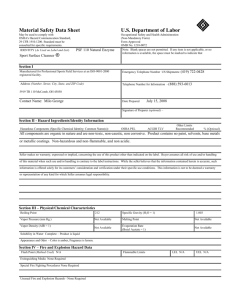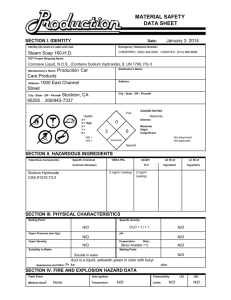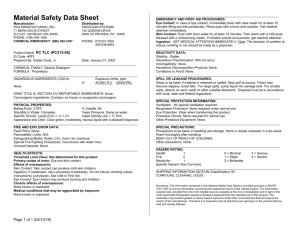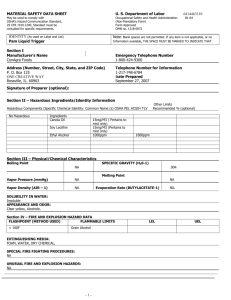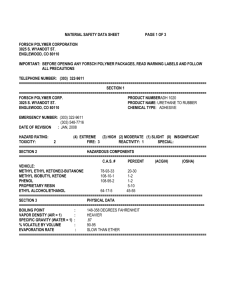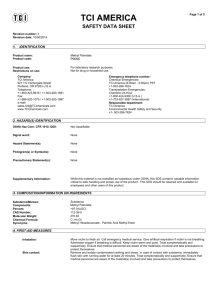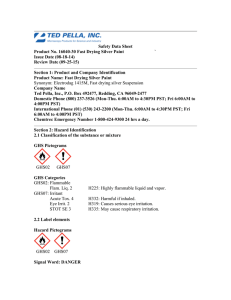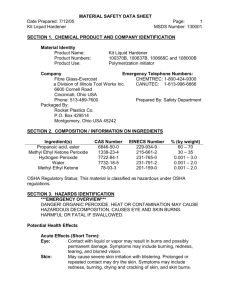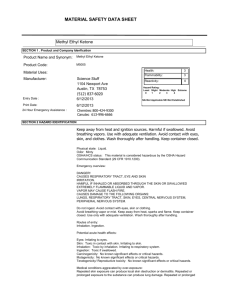View msds - General Chemical
advertisement
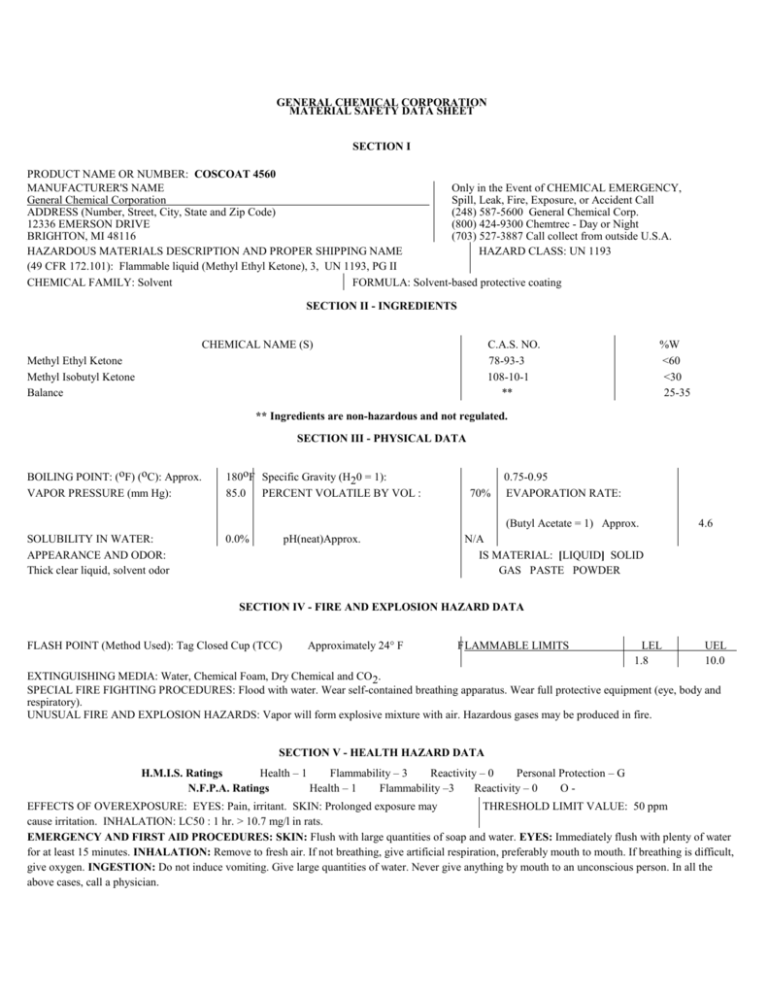
GENERAL CHEMICAL CORPORATION MATERIAL SAFETY DATA SHEET SECTION I PRODUCT NAME OR NUMBER: COSCOAT 4560 MANUFACTURER'S NAME Only in the Event of CHEMICAL EMERGENCY, General Chemical Corporation Spill, Leak, Fire, Exposure, or Accident Call ADDRESS (Number, Street, City, State and Zip Code) (248) 587-5600 General Chemical Corp. 12336 EMERSON DRIVE (800) 424-9300 Chemtrec - Day or Night BRIGHTON, MI 48116 (703) 527-3887 Call collect from outside U.S.A. HAZARDOUS MATERIALS DESCRIPTION AND PROPER SHIPPING NAME HAZARD CLASS: UN 1193 (49 CFR 172.101): Flammable liquid (Methyl Ethyl Ketone), 3, UN 1193, PG II CHEMICAL FAMILY: Solvent FORMULA: Solvent-based protective coating SECTION II - INGREDIENTS CHEMICAL NAME (S) C.A.S. NO. 78-93-3 108-10-1 ** Methyl Ethyl Ketone Methyl Isobutyl Ketone Balance %W <60 <30 25-35 ** Ingredients are non-hazardous and not regulated. SECTION III - PHYSICAL DATA BOILING POINT: (oF) (oC): Approx. VAPOR PRESSURE (mm Hg): 180oF Specific Gravity (H20 = 1): 85.0 PERCENT VOLATILE BY VOL : SOLUBILITY IN WATER: APPEARANCE AND ODOR: Thick clear liquid, solvent odor 0.0% pH(neat)Approx. 70% 0.75-0.95 EVAPORATION RATE: (Butyl Acetate = 1) Approx. N/A IS MATERIAL: [LIQUID] SOLID GAS PASTE POWDER 4.6 SECTION IV - FIRE AND EXPLOSION HAZARD DATA FLASH POINT (Method Used): Tag Closed Cup (TCC) Approximately 24° F FLAMMABLE LIMITS LEL 1.8 UEL 10.0 EXTINGUISHING MEDIA: Water, Chemical Foam, Dry Chemical and CO2. SPECIAL FIRE FIGHTING PROCEDURES: Flood with water. Wear self-contained breathing apparatus. Wear full protective equipment (eye, body and respiratory). UNUSUAL FIRE AND EXPLOSION HAZARDS: Vapor will form explosive mixture with air. Hazardous gases may be produced in fire. SECTION V - HEALTH HAZARD DATA H.M.I.S. Ratings Health – 1 Flammability – 3 Reactivity – 0 Personal Protection – G N.F.P.A. Ratings Health – 1 Flammability –3 Reactivity – 0 OEFFECTS OF OVEREXPOSURE: EYES: Pain, irritant. SKIN: Prolonged exposure may THRESHOLD LIMIT VALUE: 50 ppm cause irritation. INHALATION: LC50 : 1 hr. > 10.7 mg/l in rats. EMERGENCY AND FIRST AID PROCEDURES: SKIN: Flush with large quantities of soap and water. EYES: Immediately flush with plenty of water for at least 15 minutes. INHALATION: Remove to fresh air. If not breathing, give artificial respiration, preferably mouth to mouth. If breathing is difficult, give oxygen. INGESTION: Do not induce vomiting. Give large quantities of water. Never give anything by mouth to an unconscious person. In all the above cases, call a physician. SECTION VI - REACTIVITY DATA – COSCOAT 4560 STABILITY UNSTABLE CONDITIONS TO AVOID: Heat STABLE X INCOMPATIBILITY (Materials to Avoid): Strong oxidants and alkalis. HAZARDOUS DECOMPOSITION PRODUCTS: Decomposes with heat. May form oxides of carbon and nitrogen. HAZARDOUS MAY OCCUR CONDITIONS TO AVOID: Contact with strong oxidants, such as liquid POLYMERIZATION WILL NOT OCCUR X chlorine, concentrated oxygen, sodium hypo chlorite or calcium hypochlorite. SECTION VII - SPILL OR LEAK PROCEDURES STEPS TO BE TAKEN IN CASE MATERIAL IS RELEASED OR SPILLED: Shut off and eliminate all ignition sources. Contain spill and keep from contaminating sewers and waterways. Recover free product. Add suitable absorbent to spill. WASTE DISPOSAL METHOD: In accordance with local, state and federal regulations. SECTION VIII - SPECIAL PROTECTION INFORMATION RESPIRATORY PROTECTION : When needed, use NIOSH approved respiratory protection. VENTILATION LOCAL EXHAUST: YES SPECIAL: MECHANICAL: YES OTHER: PROTECTIVE GLOVES: Impervious gloves, such as neoprene. EYE PROTECTION: Safety Glasses OTHER PROTECTIVE EQUIPMENT: Impervious clothing, safety shower, full face shield and chemical apron. Wash thoroughly after handling this material to avoid contamination. SECTION IX - SPECIAL PRECAUTIONS PRECAUTIONS TO BE TAKEN IN HANDLING AND STORAGE: Store in well ventilated area. Keep container tightly closed. Do not store with strong oxidants, acids or alkalis. OTHER PRECAUTIONS: Empty containers retain residues and label hazard precautions. Avoid ignition sources. Empty containers should be completely drained, properly bunged and promptly returned to a drum reconditioner. Date Issued: 07-APR-2004 Supersedes: None Information presented herein has been complied to be dependable and is accurate and reliable to the best of our knowledge and belief but is not guaranteed to be so. Nothing herein is to be construed as recommending any practice or any product in violation of any patent or in violation of any law or regulation. It is the user's responsibility to determine for him/herself the suitability of any material for a specific purpose and to adopt such safety precautions as may be necessary. We make no warranty as to the results to be obtained in using any material and, since conditions of use are not under our control, we must necessarily disclaim all liability with respect to the use of any material supplied by us.
